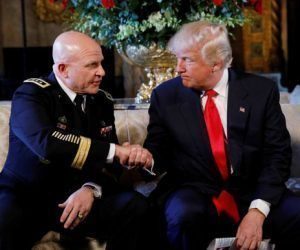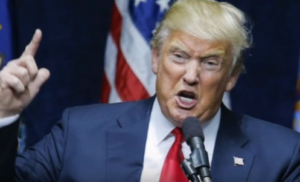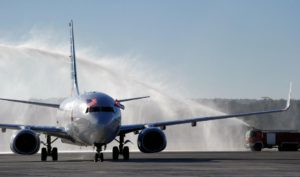Sixteen retired senior military officers are asking the Trump administration to continue the process of normalization with Cuba for the sake of U.S. national security and stability in the region.
“The location of Cuba in the Caribbean and proximity to the US make it a natural and strategically valuable partner on issues of immediate concern, including terrorism, border control, drug interdiction, environmental protections, and emergency preparedness,” the retired officers stated in a letter that was for National Security Adviser Lt. Gen. H.R. McMaster and made public on Thursday.
The retired officers indicated that ensuring economic stability on the island was beneficial to the United States for security reasons.
“We acknowledge the current regime must do more to open its political system and dialogue with the Cuban people. But, if we fail to engage economically and politically, it is certain that China, Russia, and other entities whose interests are contrary to the United States’ will rush into the vacuum,” the letter said. “We have an opportunity now to shape and fill a strategic void.”
Six of the 16 letter-signers traveled to Havana from March 14-17 at the invitation of the Cuban government and met with officials from the Foreign Ministry as well as representatives from the Energy, Agriculture, Trade, and Foreign Investment ministries. The group also visited the Port of Mariel and met with 12 Ministry of Interior officials — a gathering not previously disclosed. The MININT is in charge of domestic security but also of the Cuban intelligence services.
The Cuban officials provided “a significant hour and a half Power Point brief on their security concerns and their thoughts on cooperation with the United States,” Stephen A. Cheney, a retired brigadier general in the U.S. Marine Corps, said. “A pretty interesting group of active military folks.
“Some questioned why we did not meet with dissidents, but this was not the purpose of this trip but to listen to government people, have an idea of how it works and what their concerns are.”
The letter seeks to influence the administration while it is still reviewing Cuba policy, an exercise spearheaded by the National Security Council. The Trump administration “must take into account all national security factors under consideration” and not look at the current policy “simply as something that Obama did and because Obama did it, you hate it,” Cheney said.
The main concern from the national-security standpoint, he added, is a migration crisis if the island’s economy worsens, a possibility that “at 90 miles from our coasts, does not do us any favors.”
“If they feel desperate, they are going to reach out to those we would rather not want,” added retired Brig. Gen. David McGinnis, in reference to the growing role of China, Russia, and Iran in the region.
Cheney highlighted the level of cooperation with Cuba on issues like anti-drug efforts but said that part of the “frustration” of the Cuban government is that the routine meetings to continue these mechanisms of cooperation have been canceled by the Trump administration, “not out of a policy change but because the people are not there.”
Cheney also said the Trump administration could lift trade and financial restrictions, such as in agriculture, to the benefit of U.S. companies. “Clearly the embargo has not worked. We have to look for new actions if we want to increase our security,” said retired Lt. Gen. John G. Castellaw.
The trip and the missive were coordinated by the American Security Project (ASP), a non-partisan organization of which several of the retired officials who signed the letter are members of — Cheney is its executive director. According to an ASP statement, the trip was organized by Scott Gilbert, a member of its board and a lawyer of contractor Alan Gross, who was jailed in Cuba for five years and released on Dec. 17, 2014.
Among those who signed the letter are retired Gen. James T. Hill, who headed the U.S. Southern Command from 2002-2004 and retired Admiral Robert Inman, who held senior positions in the intelligence services under Presidents Ronald Reagan and George W. Bush.
Several signers of the letter including, McGinnis; retired Major Gen. Paul Eaton; retired Rear Admirals Jamie Barnett and Michael Smith; and retired Brig. Gen. Stephen Xenakis publicly supported Hillary Clinton during the presidential campaign.
Oficiales militares piden a Trump que continúe el proceso de normalización con Cuba .
Dieciséis oficiales militares jubilados están pidiendo a la administración Trump que continúe el proceso de normalización con Cuba por el bien de la seguridad nacional y la estabilidad de los Estados Unidos en la región.
“La ubicación de Cuba en el Caribe y su proximidad a Estados Unidos la convierten en un socio natural y estratégicamente valioso en temas de preocupación inmediata, incluyendo terrorismo, control de fronteras, interdicción de drogas, protección ambiental y preparación para emergencias” Carta que fue para el teniente general de seguridad HR McMaster y se hizo público el jueves.
Los oficiales jubilados indicaron que asegurar la estabilidad económica en la isla era beneficiosa para los Estados Unidos por razones de seguridad.
“Reconocemos que el régimen actual debe hacer más para abrir su sistema político y el diálogo con el pueblo cubano. Pero si no participamos económicamente y políticamente, es cierto que China, Rusia y otras entidades cuyos intereses son contrarios a Estados Unidos se precipitarán al vacío “, dijo la carta. “Ahora tenemos la oportunidad de dar forma y llenar un vacío estratégico”.
Seis de los 16 firmantes viajaron a La Habana del 14 al 17 de marzo por invitación del gobierno cubano y se reunieron con funcionarios del Ministerio de Relaciones Exteriores, así como con representantes de los ministerios de Energía, Agricultura, Comercio e Inversión Extranjera. El grupo también visitó el Puerto de Mariel y se reunió con 12 funcionarios del Ministerio del Interior – una reunión no divulgada previamente. El MININT está a cargo de la seguridad nacional, pero también de los servicios de inteligencia cubanos.
Los funcionarios cubanos entregaron “un significativo informe de Power Point de una hora y media sobre sus preocupaciones de seguridad y sus ideas sobre la cooperación con los Estados Unidos”, dijo Stephen A. Cheney, general de brigada retirado del Cuerpo de Marines de los Estados Unidos. -Un grupo bastante interesante de gente militar activa.
“Algunos cuestionaron por qué no nos reunimos con disidentes, pero este no fue el propósito de este viaje, sino escuchar a la gente del gobierno, tener una idea de cómo funciona y cuáles son sus preocupaciones”.
La carta busca influir en la administración mientras sigue revisando la política de Cuba, un ejercicio encabezado por el Consejo de Seguridad Nacional. La administración de Trump “debe tener en cuenta todos los factores de seguridad nacional bajo consideración” y no mirar la política actual “simplemente como algo que Obama hizo y porque Obama lo hizo, lo odias”, dijo Cheney.
La principal preocupación desde el punto de vista de la seguridad nacional, agregó, es una crisis migratoria si la economía de la isla empeora, una posibilidad de que “a 90 millas de nuestras costas, no nos haga ningún favor”.
“Si se sienten desesperados, van a llegar a aquellos que preferiríamos no querer”, agregó el jubilado Brig. General David McGinnis, en referencia al papel creciente de China, Rusia e Irán en la región.
Cheney destacó el nivel de cooperación con Cuba en temas como los esfuerzos antidrogas, pero dijo que parte de la “frustración” del gobierno cubano es que las reuniones rutinarias para continuar estos mecanismos de cooperación han sido canceladas por la administración Trump, De un cambio de política, sino porque la gente no está allí “.
Cheney también dijo que la administración Trump podría levantar las restricciones comerciales y financieras, como en la agricultura, en beneficio de las compañías estadounidenses. “Claramente el embargo no ha funcionado. Tenemos que buscar nuevas acciones si queremos aumentar nuestra seguridad “, dijo el Teniente General John G. Castellaw.
El viaje y la misiva fueron coordinados por el American Security Project (ASP), una organización no partidista de la cual varios de los funcionarios jubilados que firmaron la carta son miembros de – Cheney es su director ejecutivo. Según un comunicado de la ASP, el viaje fue organizado por Scott Gilbert, miembro de su directorio y abogado del contratista Alan Gross, quien fue encarcelado en Cuba durante cinco años y liberado el 17 de diciembre de 2014.
Entre los que firmaron la carta están jubilados el general James T. Hill, quien encabezó el Comando Sur de los Estados Unidos entre 2002 y 2004 y el almirante retirado Robert Inman, quien ocupó altos cargos en los servicios de inteligencia bajo los presidentes Ronald Reagan y George W. Bush.
Varios firmantes de la carta incluyendo, McGinnis; El general mayor retirado Paul Eaton; Los almirantes retirados Jamie Barnett y Michael Smith; Y jubilado Brig. El general Stephen Xenakis apoyó públicamente a Hillary Clinton durante la campaña presidencial.
Agencies/NuevoHerald/Norma Gámez/Internet Photos/ Arnoldo Varona/ TheCubanHistory.com
THE CUBAN HISTORY, HOLLYWOOD.










